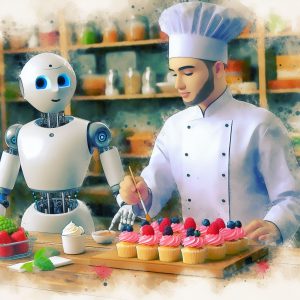Introduction:
The baking industry has witnessed a remarkable transformation in recent years, driven by the integration of artificial intelligence (AI). From automating production processes to creating innovative products, AI is revolutionizing the way businesses operate and cater to consumer needs. In this blog post, we will explore the various ways in which AI is impacting the baking industry and shaping its future.
1. Enhanced Production Efficiency:
One of the most significant impacts of AI on the baking industry is the optimization of production processes. AI-driven systems can analyze vast amounts of data, including ingredient proportions, environmental conditions, and machinery performance, to identify areas for improvement. This enables bakeries to fine-tune their processes, minimize waste, and increase overall efficiency. As a result, businesses can produce more consistent and high-quality baked goods while reducing costs.
2. Innovation in Product Development:
AI is also playing a crucial role in the development of new and innovative baked goods. By analyzing consumer preferences, market trends, and ingredient interactions, AI algorithms can generate novel flavor combinations, textures, and designs. This empowers bakery businesses to expand their product offerings, cater to changing consumer demands, and stay competitive in the market.
3. Personalized Baking Experiences:
The integration of AI has opened up new avenues for personalized baking experiences. AI-powered platforms can collect and analyze individual customer data, such as preferences, dietary restrictions, and purchase history. Based on this information, bakeries can create customized baked goods that cater to each customer’s unique needs. This personalized approach enhances customer satisfaction, fosters brand loyalty, and drives repeat business.
4. Predictive Maintenance and Quality Control:
AI-driven systems can monitor machinery and equipment in real-time, detecting anomalies and predicting potential failures before they occur. This enables bakeries to implement proactive maintenance strategies, preventing costly breakdowns and ensuring uninterrupted production. Furthermore, AI algorithms can analyze product quality parameters, such as texture, color, and taste, to ensure consistency and compliance with standards. By leveraging AI, bakeries can minimize quality issues, reduce recalls, and maintain their reputation for delivering high-quality baked goods.
5. Sustainable and Environmentally Friendly Baking:
AI is also contributing to the sustainability of the baking industry. AI-powered systems can optimize energy consumption by analyzing烘焙过程中的数据,识别浪费和提高效率. this can help bakeries reduce their carbon footprint and operate in a more environmentally friendly manner. Additionally, AI can assist in the development of sustainable packaging solutions, reducing plastic waste and promoting circularity in the supply chain.
The integration of AI in the baking industry is transforming businesses, empowering them to improve production efficiency, innovate product offerings, personalize customer experiences, and enhance quality control. By leveraging the power of AI, bakeries can unlock new growth opportunities, respond swiftly to changing market dynamics, and create a sustainable future for the industry. As AI continues to advance, we can expect even more transformative applications in the baking industry, further revolutionizing the way businesses operate and consumers enjoy their favorite baked goods.
Dangers for Bakers in the Food Industry
Working as a baker in the food industry comes with various inherent dangers:
- Exposure to Heat and Steam: Bakers work in close proximity to ovens, stoves, and other equipment that generates significant heat and steam. This can lead to burns, scalding, and heat-related illnesses.
- Repetitive Motions: Baking often involves repetitive tasks, such as kneading dough, rolling out pastries, and decorating cakes. These repetitive movements can cause musculoskeletal disorders, particularly in the hands, arms, and shoulders.
- Respiratory Hazards: Bakers may be exposed to flour dust, baking powders, and other ingredients that can cause respiratory irritation and allergic reactions. Inhaling these particles can lead to asthma, bronchitis, and other respiratory conditions.
- Chemical Hazards: Bakers handle various chemicals, including food additives, preservatives, and cleaning agents. These chemicals can cause skin irritation, eye damage, and respiratory problems if not handled properly.
- Risk of Falls: Baking often requires working on ladders, stools, and other elevated surfaces. The risk of falls and associated injuries is present in such environments.
- Long Working Hours: Bakers often work long and irregular hours, particularly during peak seasons or when preparing for special events. This can lead to fatigue, decreased alertness, and increased risk of accidents.
Possibilities of Baker Job Being Replaced by AI
The advancement of artificial intelligence (AI) and automation technologies has raised concerns about the potential displacement of jobs in the food industry, including bakers. Here are some possibilities of AI replacing bakers:
- Automated Dough Mixing and Kneading: AI-powered machines can perform the tasks of mixing and kneading dough with precision and consistency, reducing the need for manual labor.
- Automated Pastry Forming: AI-driven machines can shape and form pastries, cookies, and other baked goods with intricate designs and uniform shapes.
- AI-Enabled Recipe Development: AI algorithms can analyze vast amounts of data to create new recipes and flavor combinations, automating the creative aspect of baking.
- AI-Powered Quality Control: AI can be used to inspect baked goods for quality, consistency, and safety, reducing the need for human inspectors.
- Automated Packaging and Distribution: AI-powered machines can package and distribute baked goods efficiently, minimizing manual handling and optimizing logistics.
How AI Will Be Used to Help Bakers
While AI may pose a threat to some baker jobs, it can also be utilized to enhance the role of bakers and improve productivity in the industry:
- AI-Assisted Recipe Creation: AI can provide bakers with personalized recipe suggestions based on their ingredients, equipment, and desired results, helping them create innovative and successful recipes.
- AI-Powered Mixing and Kneading: AI-driven machines can be programmed to mix and knead dough to precise specifications, ensuring consistent results and reducing the physical strain on bakers.
- AI-Enabled Quality Control: AI can be used to automate quality inspections, ensuring that baked goods meet predetermined standards for appearance, taste, and texture.
- AI-Enhanced Training and Education: AI can provide bakers with interactive training modules, personalized feedback, and access to knowledge databases, helping them improve their skills and stay updated with industry trends.
- AI-Driven Inventory Management: AI can help bakers optimize their inventory levels, reduce waste, and ensure that they have the right ingredients on hand, increasing efficiency and profitability.
How to Adapt to the Changing Landscape
Bakers can adapt to the changing landscape and remain relevant in the food industry by:
- Embracing Technology: Bakers should embrace emerging technologies, such as AI-powered machines and software, to improve their productivity and efficiency.
- Developing New Skills: Bakers should focus on developing new skills, such as AI programming, data analysis, and digital marketing, to stay ahead of the curve and remain valuable in the evolving industry.
- Diversifying Expertise: Bakers can diversify their expertise by exploring different baking techniques, cuisines, and specialized products, making them more versatile and adaptable to changing consumer preferences.
- Networking and Collaboration: Bakers should network with industry professionals, collaborate with other bakers, and participate in professional organizations to stay informed about industry trends and opportunities.
- Entrepreneurship and Innovation: Bakers can explore entrepreneurial opportunities by starting their own baking businesses, creating innovative products, or developing new baking techniques to set themselves apart from the competition.
By embracing technology, developing new skills, and adapting to the changing landscape, bakers can continue to thrive in the food industry and secure their long-term career prospects.



